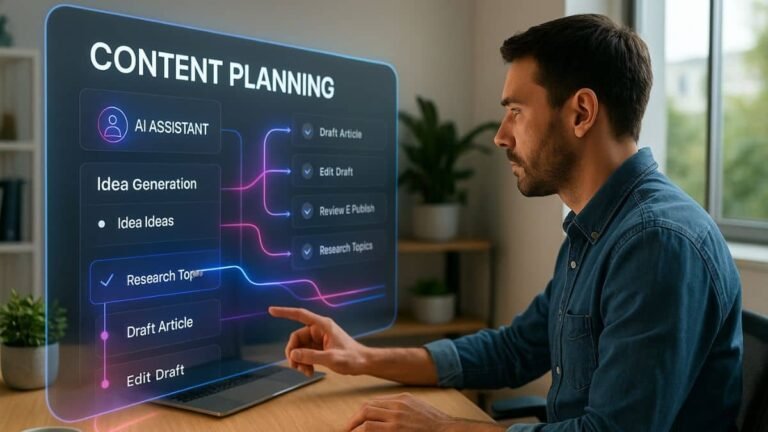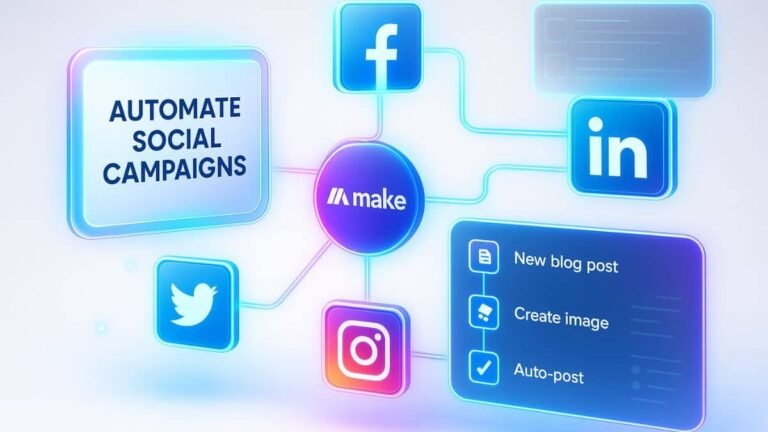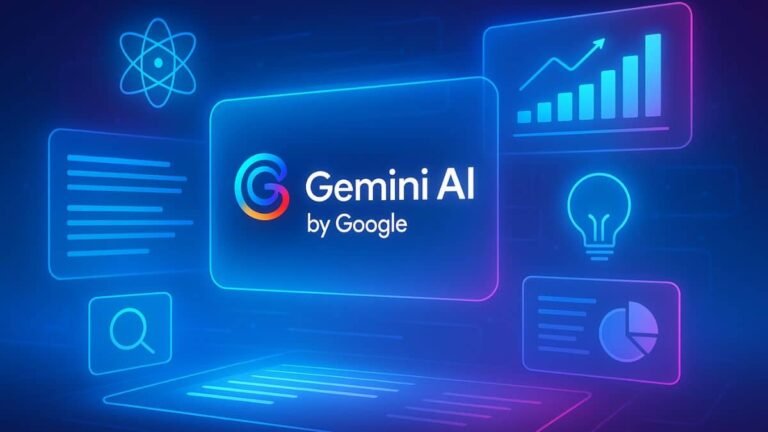Address
251 Little Falls Drive, Wilmington, DE 19808, United States

Feeling overwhelmed by the digital marketing race? You’re not alone, and that’s where AI steps in. The best AI tools for digital marketing are transforming how creators and marketers plan, execute, and scale their campaigns. From automating content to optimizing performance, these tools are game-changers. Ready to unlock the future of marketing? Keep reading, you’ll want to see what’s coming.
Table of Contents
Why AI is a Game changer in digital marketing
AI has revolutionized how digital marketing works. From content creation to personalization, the integration of artificial intelligence has made marketing not just faster, but smarter. Algorithms can now analyze consumer behavior, automate workflows, and even generate content, all in real time. It’s no longer about working harder, but about working strategically with the help of machines.
Whether you’re running ads, managing social media, or crafting content, AI tools empower marketers to make data-backed decisions and deliver high-impact campaigns. With the AI tools for productivity already reshaping workflows, diving into digital marketing tools is the next logical leap.

Key benefits of using AI Tools in marketing campaigns
- Time-saving: Automates repetitive tasks like email campaigns, reporting, or A/B testing.
- Data-driven insights: AI digs deep into metrics to uncover what truly resonates with your audience.
- Personalization: Delivers customized messages based on user behavior and preferences.
- Enhanced creativity: AI doesn’t replace creatives, it boosts their capabilities.
- 24/7 Efficiency: AI tools work nonstop, ensuring consistency across time zones.
Content creation tools that save time and drive results
AI content tools are a lifesaver for marketers who need high-quality content at scale. They help write copy, generate ideas, and even design visuals, cutting production time dramatically.
Copywriting and blog automation (e.g., Jasper, Copy.ai)
If writing drains your time, AI copy tools are here to change that. Jasper and Copy.ai can whip up blog posts, ad headlines, product descriptions, and more; all while keeping tone and style consistent. These tools learn your brand voice and scale your content strategy like never before.
AI-Powered video & visual creators (e.g., Pictory, Synthesia)
Video content is the king of engagement, and AI tools like Pictory and Synthesia let you create them without cameras or crews. These platforms convert blog posts into video summaries or even generate avatars that narrate your scripts.
Top AI tools for video content: Pictory, Descript, and More
When it comes to producing polished video content at scale, Descript is a standout. It offers text-based editing, green screen effects, AI voice cloning, and even automatic filler word removal. Pair that with Pictory’s article-to-video capabilities, and you’ve got a powerhouse combo for marketers who want studio-quality videos without the studio.

AI tools for SEO and keyword Research
AI doesn’t just help create content, it helps optimize it. From keyword suggestions to SERP insights, these tools are like having a personal SEO analyst working around the clock.
Smart optimization platforms (e.g., SurferSEO, Frase)
SurferSEO and Frase.io analyze top-performing pages and generate guidelines that help you outrank competitors. They assess keyword density, heading structure, readability, and more to build articles that search engines and readers love.
Keyword discovery and competitor insights (e.g., Semrush, WriterZen)
Semrush is a household name for keyword research, but newer tools like WriterZen are also rising fast. These platforms uncover hidden opportunities, track rankings, and provide competitor data to shape your content strategy.
AI in social media management and scheduling
Managing multiple social platforms is a full-time job—unless AI takes the reins. These tools help marketers automate post scheduling, generate engagement-driven content, and even analyze sentiment and trends in real time.
Engagement boosters and Auto-repliers (e.g., Lately.ai, Predis.ai)
Lately.ai uses AI to turn long-form content into social-ready snippets, designed to maximize engagement based on historical data. Similarly, Predis.ai analyzes your brand tone and target audience to generate social captions, carousels, and post ideas instantly.
AI scheduling and analytics (e.g., Buffer AI Assistant)
Buffer’s AI Assistant streamlines your posting strategy by suggesting optimal times, tracking engagement patterns, and automating the scheduling process, all from one dashboard. It’s built to simplify management while improving reach.

Fotor vs Canva: Choosing the Best AI Tool for Social Graphics
When it comes to designing eye-catching social media posts, both Fotor and Canva offer AI-powered templates and features. Canva excels with its Brand Kit, Magic Resize, and AI Text-to-Image tools. Fotor, meanwhile, stands out for its photo enhancements and one-click design features. The choice comes down to whether you prioritize design flexibility (Canva) or AI photo editing (Fotor).
Personalization and email marketing AI tools
Generic email campaigns are dead. Today’s audience expects personalization and AI delivers it at scale. These tools use behavior tracking, segmentation, and automation to send the right message at the right time.
Smart segmentation and predictive sending (e.g., Mailmodo, Seventh Sense)
Mailmodo leverages AI to create AMP emails with dynamic content, while Seventh Sense optimizes send times using machine learning. The result? Higher open rates and stronger engagement.
AI-Powered campaign creation (e.g., GetResponse AI)
GetResponse uses AI to suggest subject lines, content blocks, and personalized workflows based on user data. It’s especially useful for scaling campaigns without sacrificing quality or relevance.
AI for paid advertising and CRO optimization
Running ads without AI is like navigating blindfolded. These tools bring clarity by optimizing ad creative, targeting, and landing pages to deliver better ROI.
Ad copy generators (e.g., AdCreative.ai, Pencil)
AdCreative.ai auto-generates conversion-optimized ad creatives across platforms. Pencil, on the other hand, uses predictive AI to show you which creatives are likely to perform best based on data modeling.
Conversion rate optimization tools (e.g., Unbounce Smart Traffic)
Unbounce’s Smart Traffic uses AI to route visitors to the landing page variant that’s most likely to convert. Instead of running long-term A/B tests, this tool adapts in real time, based on user behavior patterns and intent.

CRM and customer insight tools enhanced by AI
Your CRM shouldn’t just store data, it should help you act on it. AI-enabled CRMs give you real-time insights, predictive analytics, and automation features that deepen customer relationships.
AI Chatbots and assistants (e.g., Drift, ManyChat)
Drift personalizes chat flows based on visitor behavior, while ManyChat helps you build conversational experiences on Messenger, Instagram, and WhatsApp; all driven by AI. These bots reduce support time and increase qualified lead capture.
Predictive analytics for customer behavior (e.g., HubSpot AI, Salesforce Einstein)
HubSpot AI assists in lead scoring, predictive forecasting, and personalization across the funnel. Salesforce Einstein takes it further with sales automation, email insights, and AI-driven opportunity predictions that help close deals faster.
Mastering planning & automation with AI: Make, ClickUp, Gemini Compared
Great digital marketing requires more than flashy content, it needs organized execution. AI planning tools streamline workflows, automate campaign triggers, and provide insights into task prioritization. Let’s explore how Make, ClickUp, and Gemini compare.
- Make (formerly Integromat): A powerful visual automation tool that connects apps and automates complex workflows. AI modules can trigger actions based on behavior or performance metrics; great for multi-channel campaigns.
- ClickUp: Beyond project management, ClickUp’s AI assistant helps you generate task descriptions, summarize updates, and set smart deadlines. It’s a centralized hub for marketing teams juggling dozens of tasks.
- Gemini (by Google): As Google’s AI assistant evolves, Gemini is expected to integrate deeply with productivity and planning tools; ideal for marketers managing Google Ads, Sheets, and Docs in one ecosystem.
Using AI across project management doesn’t just improve speed, it reduces human error and allows teams to focus on creative thinking.

Real-Life examples: How top brands use AI to win online
Coca-Cola uses AI to personalize customer interactions across social media and e-commerce, enhancing both brand loyalty and conversions. Netflix relies heavily on AI for content recommendations, and this same tech is applied to their marketing campaigns, targeting viewers with high-converting visuals and taglines. Even small brands now use Mailmodo and AdCreative.ai to create email and ad campaigns that look like they were crafted by expert teams.
AI isn’t a luxury for mega brands anymore, it’s a necessity for anyone trying to stay competitive in digital marketing.
How to choose the right AI tools for your digital strategy
With so many options, it’s easy to fall into the “shiny tool trap.” Before subscribing to everything, ask yourself:
- What stage is my marketing at—startup, scaling, or enterprise?
- Do I need content creation, analytics, automation, or all three?
- Can this tool integrate with my current tech stack?
- Does it save time or just add complexity?
- Is there a free trial or sandbox to test before buying?
Prioritize tools that align with your current workflow and offer long-term scalability. Sometimes, one great tool is better than five mediocre ones.
Emerging trends in AI marketing Tools you should watch
AI in digital marketing isn’t just a trend, it’s an evolving ecosystem. As technology continues to advance, new innovations are reshaping how we approach everything from personalization to performance tracking. Staying ahead means keeping an eye on these rising trends and tools poised to disrupt the status quo.
Generative AI for Hyper-personalized experiences
Forget basic “Hello [First Name]” personalization. New generative AI models now customize entire user journeys. Platforms like Adobe Sensei and Dynamic Yield are leveraging deep learning to serve dynamic landing pages, real-time content adjustments, and personalized product recommendations based on past behavior, location, and even weather.
This means no two users see the same webpage or receive the same email, it’s marketing down to the individual level. The result? Higher engagement, better retention, and stronger ROI.
AI-Powered predictive analytics for smarter campaigns
AI is shifting from reactive to predictive. Tools like Crimson Hexagon and Pecan AI can now forecast campaign performance, customer churn, or even sales spikes with uncanny accuracy. By analyzing historical data, they help marketers make decisions before problems occur or before opportunities slip by unnoticed.
Predictive analytics empowers marketers to invest in what works and abandon what doesn’t, before it impacts the bottom line.
Voice and conversational AI in marketing
With the rise of voice search and smart assistants, marketing is becoming more conversational. AI tools like Dialogflow and Microsoft Azure Bot Services allow brands to build smart voice assistants and chatbots that offer instant responses, guide buying decisions, or even handle transactions.
Incorporating voice-based experiences into digital campaigns is no longer optional, it’s becoming essential, especially in eCommerce and service-based industries.
AI-Powered video analysis and engagement scoring
Video analytics has evolved past simple view counts. AI tools like Veed.io and Vidyard’s AI are beginning to analyze video watch time, emotional reactions, and even viewer drop-off points to help creators optimize future content. AI can now determine which scenes were most impactful and suggest edits to improve results.
This level of insight allows marketers to fine-tune not just their messaging, but the exact delivery of that message on-screen.
Ethical AI and data privacy in marketing
As AI becomes more powerful, so does the responsibility to use it ethically. Consumers are increasingly aware of how their data is being used, and regulations like GDPR and CCPA are just the beginning.
Tools like OneTrust and Osano help marketers remain compliant while still leveraging data-driven insights. Meanwhile, privacy-focused AI solutions are emerging that allow for personalization without storing personal data through federated learning and anonymized analytics.

Augmented creativity with Human + AI collaboration
The future isn’t human vs AI, it’s human + AI. Creative platforms like RunwayML and Adobe Firefly are giving marketers new visual storytelling tools powered by machine learning. These platforms allow creators to generate entire visual campaigns based on a text prompt, yet still offer control over branding, layout, and tone.
This collaborative approach to creativity not only speeds up production, it pushes the boundaries of what’s possible with content marketing.
“The most successful marketers of tomorrow won’t be replaced by AI—they’ll be empowered by it.”
By exploring these emerging tools and trends, you position yourself not just as a marketer, but as a forward-thinking strategist ready to lead in the age of intelligent automation.
Final thoughts: What’s next in the future of AI marketing
The pace of AI innovation isn’t slowing. From real-time voice synthesis to predictive ad spend allocation, we’re entering a world where digital marketing is powered more by algorithms than intuition. The key isn’t to fear it but to embrace the AI wave strategically.
The best AI tools for digital marketing aren’t just about automation, they’re about unlocking new possibilities, saving time, and delivering meaningful results. Start small, stay focused, and scale smart. Because in the future, marketing without AI will be like sailing without wind.
The future belongs to those who adapt; and the best AI tools for digital marketing make that easier than ever. Whether you’re optimizing ads, crafting killer content, or automating tasks, AI is your unfair advantage. Start testing, keep learning, and unlock your next level of growth. Have a favorite AI tool we missed? Let us know in the comments!










